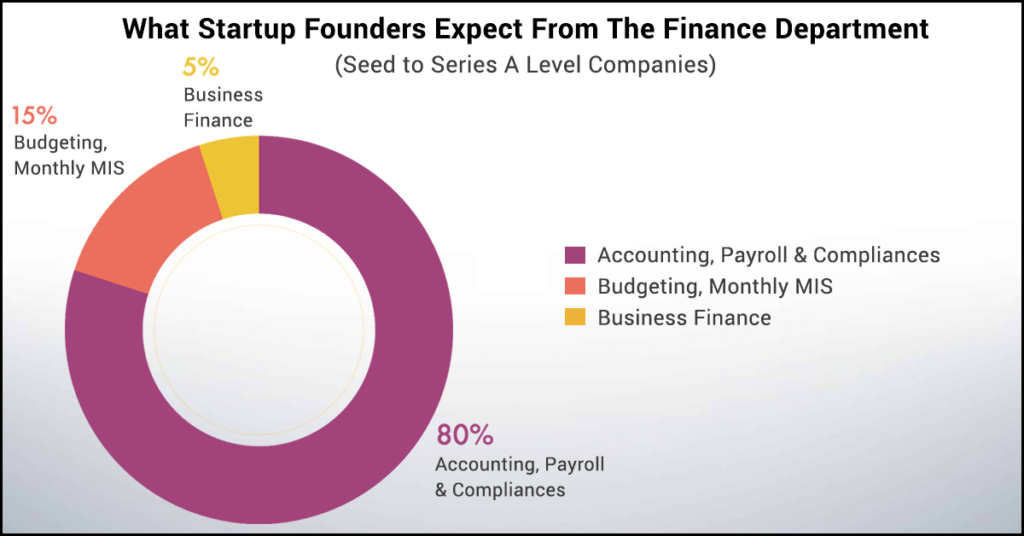
The finance department forms an integral part of any organization’s growth story, be it a startup or an established firm. While the term ‘finance department’ often resonates with money, this department covers a wider range of functions related to achieving financial stability for the overall system. As the company grows, the role of the finance department also evolves to become more significant and defined. However, in an early stage company, the finance department aims to make quick business decisions and streamline work processes in a cost-effective manner.
In this post, I outline the key roles and responsibilities of the finance department in a startup.
What Startup Founders Expect From The Finance Department
From my interactions with startup founders, I have gathered that the most common expectation from the finance department is to maintain accounting and statutory compliance hygiene in the system. This mostly holds true for Seed to Series A level companies.
- 80% of the founders restrict finance roles to be the custodians of the back office.
- About 15% of the founders expect the finance department to participate in the budgeting process, and churn out monthly MIS reports.
- A mere 5% of the founders expect the finance department to play a strategic role in business. This involves managing pricing, contracting, and vendor or customer negotiations.

The trend changes after Series A funding when the focus on specialized finance professionals increases. At this point, there arises the need for a CFO who can also play a strategic role in the business. In this scenario, the finance department is expected to take on additional key responsibilities such as budgeting, finance analysis, treasury, contracting, and interactions with investors.
5 Essential Roles of the Finance Department in a Startup
- Bookkeeping
This involves tracking and recording every single transaction associated with your startup. The objective of the finance department is to maintain flawless bookkeeping. This role also includes payroll management, and providing the right chart of accounts for managing MIS expectations of the management. - Tax and Compliance
The finance department must ensure that statutory compliances are in order for the startup by submitting all government paperwork accurately and in a timely manner. A robust maker-checker process can be implemented to reduce any chances of error. - Finance Planning & Analysis
The finance department’s role goes beyond just bookkeeping. It also involves data analysis to provide insights for decisions that impact the future. The finance department must be in a position to scrutinize any decisions taken by the senior management, analyse its efficiency, and assess the risks involved. Providing timely and accurate information to assist decision-makers is a highly valued KPI of the finance department. - Providing Strategic Guidance
Another key responsibility of the finance department is in crafting strategy that could potentially drive the growth of the start-up. The availability of data collected from sophisticated tools, combined with the right expertise and refined strategy can help set realistic long-term goals for the startup. Some of the areas where the finance department can add significant value is in identification of the right pricing strategy, target market, and even product mix. - Fund Raising
Startups seeking to raise funds in the near future must ensure a well-kept book. The right way to convince an investor of your startup’s capabilities could lie with your finance department. Operational excellence is critical to fund raising and can be driven by a team of financial experts.
To summarize, the finance department must be able to make the right decisions at each stage of growth to ensure profitability, longevity and success for the startup.
I hope this article has been a helpful guide in understanding the essential responsibilities of the finance department in a startup. Once you understand what your finance department will be handling, it will be much easier for you to build the talent you need for these roles, either in-house or by outsourcing your finance function. Contact Us for more information on outsourced CFO services for your startup.
About The Author
Deepak Kaushik is the Founder and CEO of FinAKS Global. A CA with more than 20 years of experience, Deepak brings a holistic yet focused outlook to business finance given his experience in industries such as FMCG, Financial Services, IT and BPO.